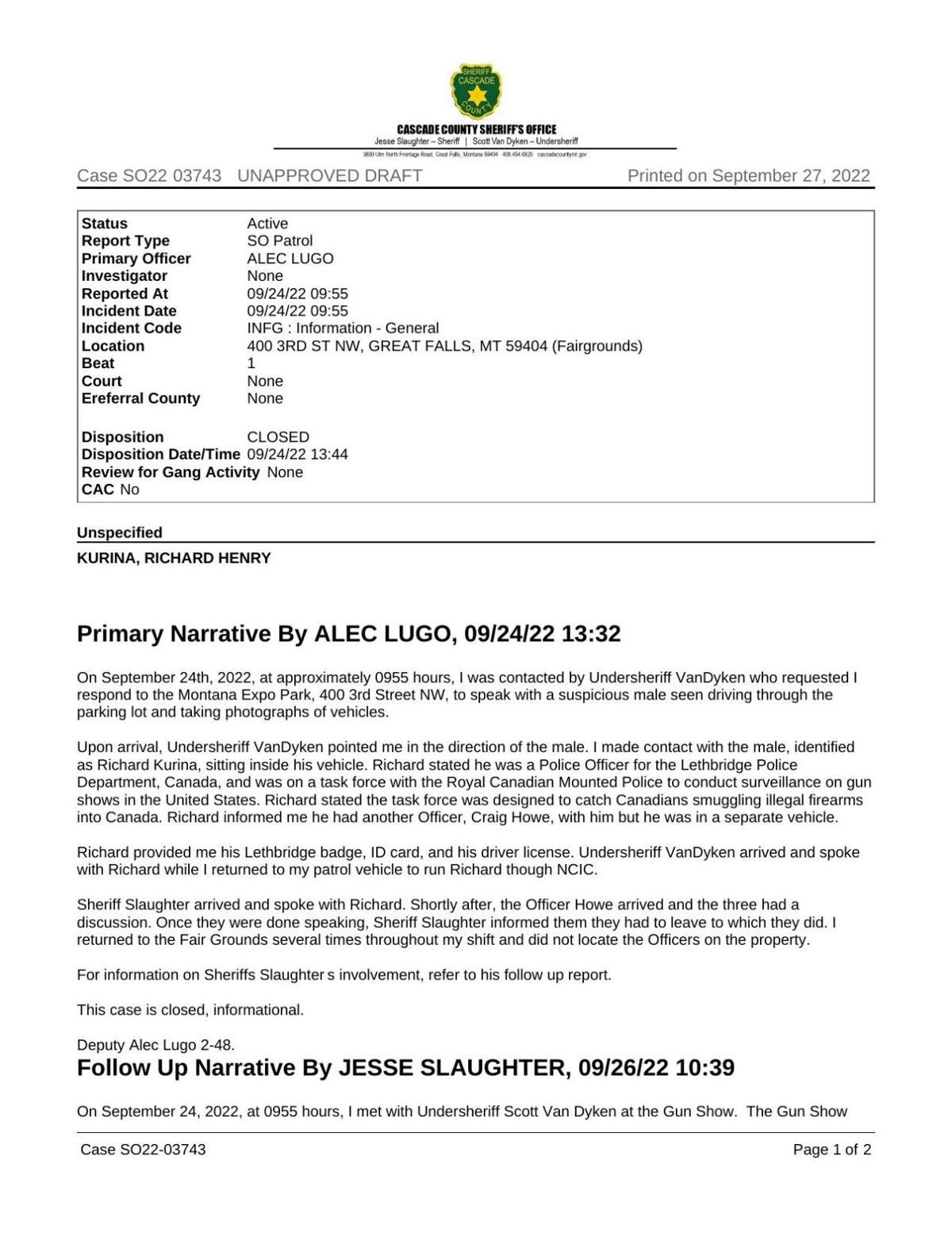Federal bureaucraps working with foreign operatives to spy on U.S. & Canadian citizens. Well, to be honest, nothing surprising.
Cascade County sheriff breaks up federal investigation at gun show
Cascade County Sheriff Jesse Slaughter on Saturday broke up an investigation carried out in apparent coordination between federal and Canadian authorities at a Great Falls gun show, saying those agencies had not contacted his office beforehand.
Although state law does not require federal investigators to obtain approval from local law enforcement to conduct operations, the agents left the fairgrounds “reluctantly” and without issue. Slaughter has positioned himself as a “constitutional sheriff,” which theorizes sheriffs are the ultimate authority in their county — above local, state and federal officials — raising questions in this incident about possible friction between layers of law enforcement.
According to a Sept. 24 report compiled by the Cascade County Sheriff’s Office, Slaughter and a deputy responded to a complaint that a man at the Montana Expo Park was acting suspiciously by taking photographs of vehicles. According to the fairgrounds director, the man was driving around the property in a black SUV with Canadian license plates, but never entered the show.
A deputy contacted the man, who identified himself as Richard Kurina, a Canadian police officer with the Lethbridge Police Department working with a Royal Canadian Mounted Police task force. According to the sheriff’s office report, Kurina said the task force was designed to catch Canadians smuggling illegal firearms into Canada and that he was with another officer, Agent Craig Howe with the U.S. Bureau of Alcohol, Tobacco, Firearms and Explosives.
After a discussion under the fairgrounds’ grandstands, Slaughter “informed them they had to leave, to which they did.”
“I told Craig that because he did not tell me about the operation, they were no longer allowed to continue conducting it,” Slaughter wrote in his section of the report. “Craig then stated he does not have to tell me, insinuating that because he is a federal agent he is not required to do so.”
In a phone interview Thursday, Slaughter acknowledged that federal agents in fact do not have to make contact with local law enforcement.
The offices of the ATF, the RCMP and Lethbridge Police Department did not immediately return requests for comment Thursday.
The sheriff also said he has constitutional questions about the legality of the investigation.
“I don’t know what their investigation was, it’s important that you print that,” Slaughter said, noting again the two investigations he was told about; looking for Canadians smuggling guns to the north, and investigating an American who was not licensed to sell firearms.
Slaughter said that had the federal and Canadian agencies contacted his office prior to Saturday’s incident, he would have been able to call off questions of who the agents were, or what they were doing, allowing the investigations to proceed.
Asked Thursday if drawing attention to the federal agents put those law enforcement officers in jeopardy, Slaughter said their police work outed themselves.
“We don’t know they’re undercover,” Slaughter said. “We don’t know who they are, but we have them acting suspiciously.”
Slaughter said he expects next legislative session, which begins in January, to see passage of a bill that would require federal agencies to make contact with local law enforcement before launching an investigation on the ground. Such a law would further validate his stance as a “constitutional sheriff.”
Such proposals, known previously under the banner of “Sheriffs First,” have failed to pass muster in the state Legislature before. In 2011, a Republican state Senator from Thompson Falls introduced a bill that would have subjected federal agents to kidnapping or trespassing charges if they failed to obtain permission from the local sheriff to effectuate an investigation. Supporters said the legislation would prevent the bloodshed seen in episodes like the 1993 federal raid in Waco, Texas.
But state law enforcement officers and prosecutors called the measure unconstitutional, adding it would disrupt important federal operations and interagency cooperation of state, local and federal officials.
A legislative committee ultimately gutted that bill by removing the requirement agencies receive permission to begin investigations and replacing it with non-binding language merely encouraging agencies to “use the knowledge and expertise” of local law enforcement.
Gov. Marc Racicot, a Republican, had vetoed similar legislation in 1995 and in 2011, Democratic Gov. Brian Schweitzer vetoed the proposal again, writing it was “unenforceable and therefore unnecessary.”
“Communication between federal and state law enforcement officials is established when those law enforcement officials talk to each other,” Schweitzer’s April 13, 2011 veto read. “Communication is not established through passage of frivolous legislation.”
It’s unclear if federal agencies have become less inclined to work with Slaughter since he has taken a public stance as a constitutional sheriff. Asked if he believed they had, Slaughter deferred.
“If that’s the issue, that’s their issue, not mine,” he said. “I’ve always had a cooperation with the federal government. But it has to be reciprocal. It’s not just a one-way communication.
“We’re all on the same team and we should be working together, not separately.”

